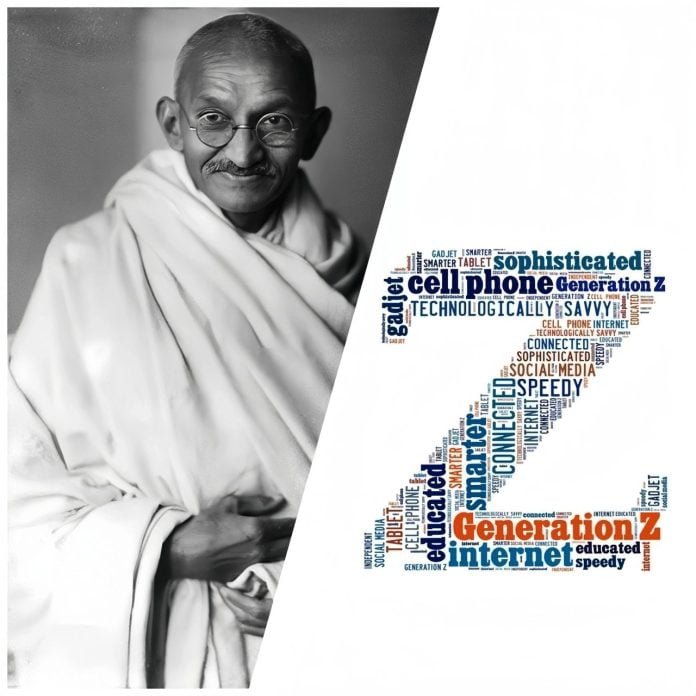In history, few figures stand as tall and enduring as Mahatma Gandhi. Also known as the “Father of the Nation” in India, he left an unwavering mark on the world through his commitment to truth, practice of non-violence, and civil disobedience. But Bapu’s legacy extends far beyond the annals of the past; it reverberates powerfully in the modern world, where his principles and ideas continue to shape society and inspire positive change. In an era marked by rapid technological advancement, political upheaval, and evolving societal norms, it might seem improbable that the teachings of a man who lived in a different time and place could remain relevant. However, Gandhi’s influence does not only lie in mere textbooks counting his life’s achievements, but also continues to show the society the right path through his core principles. It’s that simple and profound for our Gen Z, Rohan Biswas, A 21 year old working professional from Kolkata IT hub expresses to true to life “If you want to see the change, be the change! Stop complaining and start working, this is what even my parents say. Thank you Bapu for inspiring Generations ahead.”
Eras apart: Bapu and Gen-z
In the age of Gen Z, characterized by digital fluency, social activism, and a passion for change, the teachings of Mahatma Gandhi may seem like distant echoes from a different era. However, a closer look reveals that Gandhi’s principles hold profound relevance for this generation. 1.Digital march- Gandhi believed in equality for all and did not discriminate among people based on characteristics like caste or colour. Gen Z should take it as an inspiration no to discriminate anyone based on things that are found different in the society like the LGBTQ+ community. Gandhi’s advocacy for the rights and dignity of all, regardless of caste, religion, or social status, aligns with Gen Z’s commitment to inclusivity and diversity. 2.#gandhigiri- Gandhi’s principle of non-violence teaches Gen Z that change is possible without resorting to aggression or violence. In an age where online bullying and hate speech are prevalent, Gandhi’s message of peaceful resistance can inspire Gen Z to seek constructive and non-violent ways to address conflicts.
Gen Z, raised in the age of social media, can leverage these platforms for social justice, just as Gandhi used newspapers and letters to mobilize support. Gandhi’s effective communication skills and use of media can serve as a model for Gen Z’s online activism. 3.Simple living high thinking- Mahatma Gandhi’s commitment to environmental sustainability was deeply embedded in his daily life. He wore homespun khadi clothes by using a simple charkha for cloth production and lived in a small ashram. Gandhi’s advocacy for sustainability, simplicity, and self-sufficiency aligns with Gen Z’s concerns about climate change and environmental sustainability. Gen Z can adopt Gandhi’s principles of reducing consumption of resources and living in harmony with nature to address modern environmental challenges. 4.Resilience redefined- Gen Z’s pursuit of justice- Gandhi’s resilience and unwavering dedication to his principles, even in the face of opposition and imprisonment, can inspire Gen Z to persevere in their own quests for justice and change. 5.The minimalist manifesto- Gandhi’s simple lifestyle and rejection of materialism can encourage Gen Z to prioritise purpose and meaning over material possessions. In a rapidly changing world, the timeless wisdom of Mahatma Gandhi serves as a source of inspiration for Gen Z’s aspirations for a more just, inclusive, and sustainable society. By embracing these lessons, Gen Z can carry forward Gandhi’s legacy and continue the quest for positive change in the modern era.
Gandhi’s core principles
1.Non-Violence: Gandhi’s most renowned principle was non-violence. He firmly believed that violence begets more violence and that true change could only be achieved through peaceful means. 2.Truth: Gandhi believed in the absolute power of truth. He emphasized the importance of honesty in thought, speech, and action. To him, the pursuit of truth was essential in the fight against injustice, and he often referred to his autobiography as “The Story of My Experiments with Truth.” 3.Civil Disobedience: Satyagraha, or civil disobedience, was Gandhi’s method of non-violent resistance. It involved peacefully disobeying unjust laws and policies while being willing to accept the consequences of one’s actions.
4.Self-Discipline: Gandhi believed that self-discipline was fundamental to personal and societal transformation. He advocated for individuals to live according to their inner moral compass and to act in accordance with their principles, even when faced with adversity. 5.Simplicity and Self-Sufficiency: Gandhi led by example when it came to simplicity. He lived a modest and austere life, demonstrating that material possessions should not be the focus of one’s existence. 6.Equality and Social Justice: Gandhi was a staunch advocate for equality among all individuals, regardless of caste, religion, or social status. He fought against the caste system and untouchability, advocating for the rights and dignity of all people. 7.Human Dignity: Gandhi believed in the intrinsic worth and dignity of every human being. He worked tirelessly to uplift the downtrodden and marginalized, emphasizing their rights and humanity. 8.Tolerance and Interfaith Harmony: Gandhi was deeply respectful of all religions and believed in the importance of interfaith dialogue and cooperation. He saw religion as a force for unity and social harmony rather than division. 9.Fearlessness: Gandhi encouraged individuals to overcome fear, as fear could paralyze and hinder progress. He believed that fearlessness was essential in the pursuit of truth and justice. Drawing curtains on the exploration of Mahatma Gandhi’s relevance in the age of Generation Z, one thing becomes abundantly clear: Gandhi’s teachings, even though being decades old in the past, shines as guiding stars in the complex of modern society. In an era characterized by digital dynamism, Gen Z, armed with smartphones and a passion for change, might initially appear worlds apart from the Mahatma who wielded a spinning wheel and preached non-violence on dusty Indian roads. However, wisdom of Gandhi continues to resonate with Gen Z in profound ways. By: freelance journalist, reporting for true to life
